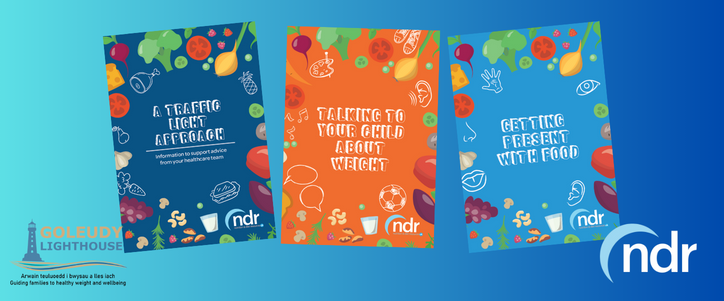Tier 3 Paediatric Weight Management

Published: 15.02.24
NDR-UK are delighted to be working with the Lighthouse Children and Young People’s Weight Management Service, Swansea Bay UBH (NHS Wales). As part of this commissioned project, 3 new titles have been developed, providing holistic support that aims to support children and young people to reach and maintain a healthier weight through behaviour change:
Interested to find out more about the service? Read on as the team share details below...
What is the Lighthouse Service?
The Lighthouse Service in Swansea Bay University Health Board was launched in early 2023 as part of the Healthy Weight: Healthy Wales Welsh Government strategy. The service and strategy aim to help support families to identify, manage or avoid the challenges that can be associated with excess weight. Research, as well as our clinical experiences, tells us that children with excess weight are more likely to have, or to develop health issues related to their body weight and that these health issues can continue or become worse during adolescence and adulthood. These challenges can include things like bone and joint problems, pain, high blood pressure and high cholesterol, diabetes, and poor psychological wellbeing.
"We recognise that people's relationship with weight is emotive and personal. So, as a service, we want to support families through their journey using a non-judgemental and holistic approach, taking into account the complexity of weight management."
The service offers a range of group interventions, workshops and individual support to best meet the young persons’ needs. Our multi-disciplinary team is made up of:
- a Physiotherapist who can support with pain management and increasing fitness
- a Dietitian who can support with diet and lifestyle changes
- a Clinical Psychologist and Assistant Psychologist who support with emotional and behavioural difficulties
- a Pediatrician to explore the potential medical risks and complications associated with excess weight
- two Therapy Assistant Practitioners who support all of above
- a Team Administrator.
Why have these resources been developed?
Talking to my child about weight
It is recognised that there is a lot of shame and stigma associated with weight management, and parents/carers might face challenges when talking to children and young people about this. Language is paramount when offering guidance and support, and ensuring that individuals do not feel blamed or shamed is a core value of the Lighthouse Service.
"We want to support parents/carers to have open and supportive conversations with their children, to help build relationships, enhance self-esteem and recognise that there is more to them than their weight and/or appearance. It is hoped that 'Talking to your child about weight' will give them guidance to do this and support clinical discussions around this."
A traffic light approach
There is no ‘one-size-fits-all’ eating pattern for weight management; families should be offered various nutritional strategies that are patient-centred and flexible. 'A Traffic Light Approach' is one of the approaches that a family might try in an effort to make changes to the energy density of their diet. It should be used in combination with healthy eating principles, which are a key element included in the resource, and only for patients who have been assessed by a dietitian as being appropriate to use this type of approach.
"It’s a simple way of communicating the principle of energy density with families, allowing clinicians to focus attention towards reducing the amount of high-energy (often high fat/sugar, low fibre, highly processed) foods. It’s not a prescriptive diet; rather, families should be encouraged and supported to make healthy food swaps to increase intake of green foods and/or reduce intake of red foods."
Getting present with food
Similarly, 'Getting present with food' (mindful eating) is another approach that may be introduced to families. Mindfulness is a technique that involves bringing ones full attention to the present moment, without judgement or trying to change anything. Research suggests many benefits to the use of mindfulness and there are many ways someone can introduce it to their day to day. Mindful eating is one way of doing this and aims to support individuals to become more aware of their thoughts, feelings and behaviours in relation to their eating. It is important to emphasise this is not a form of dieting nor an approach to lose weight. Instead, the aim is to enhance their awareness of their relationship with food. For instance, if someone is using food as a way to cope with emotional difficulties, having increased awareness of this and their own thoughts, feelings and behaviours, can aid them to make alternative choices and introduce other coping strategies that may be more in line with reaching their goals.
Resources in practice
The Lighthouse Service aims to have a menu of resources available for families to support them with achieving their goals.
"We recognise there is a vast amount of valuable information that would benefit most families who are supported by our service and the development of these resources supports us to share some key messages and advice. We hope to provide these leaflets to families when having clinical discussions around these topics. They will support clinical interventions and may be a tool used to guide goal setting and change."
The service has hopes that further resources may evolve from these leaflets, such as interactive workshops and/or videos, to encourage further discussions around these topics.
What's next?
The resources are currently being translated into Welsh - keep an eye out for updates as Welsh versions will be made available on NDR Prescribe in the coming months.
View the range, order and Prescribe by clicking here.
